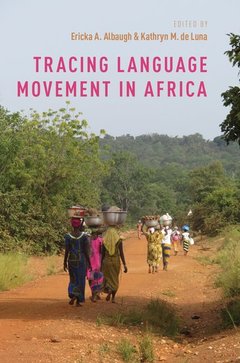Tracing Language Movement in Africa
Langue : Anglais
Coordonnateurs : Albaugh Ericka A., de Luna Kathryn M.

The great diversity of ethnicities and languages in Africa encourages a vision of Africa as a fragmented continent, with language maps only perpetuating this vision by drawing discrete language groups. In reality, however, most people can communicate with most others within and across linguistic boundaries, even if not in languages taught or learned in schools. Many disciplines have looked carefully at language movement and change on the continent, but their lack of interaction has prevented the emergence of a cohesive picture of African languages. Tracing Language Movement in Africa gathers eighteen scholars together to offer a truly multidisciplinary representation of language in Africa, combining insights from history, archaeology, religion, linguistics, political science, and philosophy. The resulting volume illuminates commonalities and distinctions in these disciplines' understanding of language change and movement in Africa. The volume is empirical -- aiming to represent language more accurately on the continent -- as well as theoretical. It identifies the theories that each discipline uses to make sense of language movement in Africa in plain terms and highlights the themes that cut across all disciplines: how scholars use data, understand boundaries, represent change, and conceptualize power. The volume is organized to reflect differing conceptions of language that arise from its discipline-specific contributions: that is, tendencies to study changes that consolidate language or those that splinter it, viewing languages as whole or in part. Each contribution includes a short explanation of a discipline's theoretical and methodological approaches to language movement and change to ensure that the chapters are accessible to non-specialists, followed by an illustrative empirical case study. This volume will inspire multidisciplinary conversations around the study of language change in Africa, opening new interdisciplinary dialogue and spurring scholars to adapt the questions, data, and method of other disciplines to the problems that animate their own fields.
Ericka A. Albaugh teaches and researches on the politics of language, ethnic conflict, and political development in Africa. She has conducted field research in Cameroon, Senegal, Ghana, Cote d'Ivoire, and Burkina Faso, and has written articles on language politics, education, and elections on the continent. Her recent book is entitled State-Building and Multilingual Education in Africa (Cambridge University Press, 2014), and she is currently researching the spread of lingua francas within and across state boundaries. Kathryn M. de Luna is an historian of Central Africa and publishes in the fields of history, linguistics, and archaeology. Her first book, Collecting Food, Cultivating People: Subsistence and Society in Central Africa (Yale University Press, 2016) won the Wallace Award. She is currently researching the politics of early central African pyrotechnologies and bodily senses and is beginning a project on human mobility and future and past climates in central Zambia.
Date de parution : 03-2018
Ouvrage de 444 p.
23.6x16.5 cm
Thème de Tracing Language Movement in Africa :
© 2024 LAVOISIER S.A.S.



